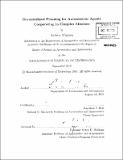Decentralized planning for autonomous agents cooperating in complex missions
Author(s)
Whitten, Andrew (Andrew Koo)
DownloadFull printable version (9.683Mb)
Other Contributors
Massachusetts Institute of Technology. Dept. of Aeronautics and Astronautics.
Advisor
Jonathan P. How.
Terms of use
Metadata
Show full item recordAbstract
Planning for autonomous vehicles remains an important and challenging research topic. This thesis focuses on decentralized planning for autonomous agents performing complex missions. These types of missions often involve a set of tasks, each representing a component of the mission. Task planning algorithms may be used as part of the mission planner to assign agents to tasks; however, the decentralized task assignment problem becomes increasingly difficult when there exists coupling in the task set. Coupling may be in the form of assignment relationships, where the value of a task is condition on whether or not another task has been assigned, or temporal relationships where the value of a task is conditioned on when it is performed relative to other tasks. In this work, task coupling is treated as a constraint, and a task planning framework is introduced which is specifically designed to ensure that all coupled constraints are satisfied by the assignment. The new algorithm is developed from a baseline Consensus-Based Bundle Algorithm (CBBA) and is called Coupled- Constraint CBBA, or CCBBA. The new algorithm is compared to the baseline in a complex mission simulation and is found to outperform the baseline by up to a factor of 3 with respect to assignment score. A separate extension to CBBA is also developed for satisfying refuel constraints in the task assignment process, and the technique is verified through numerical simulation. Lastly, this thesis examines the autonomous search problem where a fleet of sensor-equipped agents are deployed to find objects of interest in an environment. A local search strategy developed for the Onboard Planning System for UAVs in Support of Expeditionary Reconnaissance and Surveillance (OPS-USERS) program is described, which is a receding horizon optimization technique. A global search strategy is also described which extends the planning horizon of the local search strategy by incorporating larger amounts of information into the planning. The two strategies are compared both with and without an artificially simulated human operator, and the global search strategy is shown to outperform the local search strategy in terms of number of targets found.
Description
Thesis (S.M.)--Massachusetts Institute of Technology, Dept. of Aeronautics and Astronautics, 2010. Cataloged from PDF version of thesis. Includes bibliographical references (p. 121-125).
Date issued
2010Department
Massachusetts Institute of Technology. Department of Aeronautics and AstronauticsPublisher
Massachusetts Institute of Technology
Keywords
Aeronautics and Astronautics.